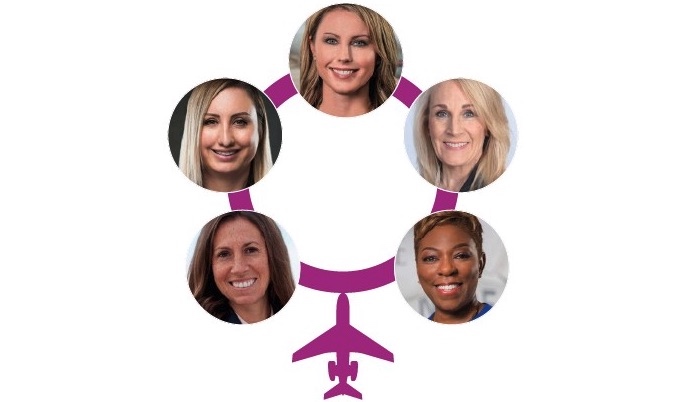Attracting more women into business aviation is seen by many as a solution to personnel shortages. BAI talks to five women leaders from the sector to find out how women can get ahead in the sector.
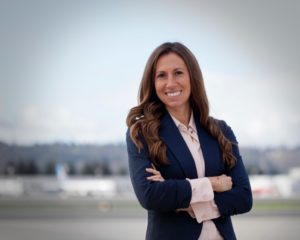 Kimberly Perkins Pilot
Kimberly Perkins Pilot
Founder and president of Aviation for Humanity
How and why did you get into business aviation?
My first business aviation job was on a Learjet 60 based in Kuala Lumpur, Malaysia. I flew all around Southeast Asia on a year contract before returning to the USA. I was totally hooked on business aviation. I loved the complexity of the trips, organizing and managing the details of the flights, and seeing remote regions of the world. That was ten years ago, and while I’ve changed jobs and jets a couple of times, I’ve never left business aviation.
How can we encourage more women into business aviation?
We need systemic change. Professionals are swapping out their seats in corporate jets for seats in airliners. As a working parent, two quality-of-life benefits immediately come to mind why this is the case, schedule predictability and options for variable utilization.
Airlines offer workload variations that crewmembers can bid on. If someone wanted to work more, there are options to bid a schedule with a high utilization. The same applies if someone wanted a reduced number of days away. Business aviation could adopt a similar structure and pay could reflect utilization so its equitable. I know plenty of working caregivers that would value such an option.
Is there equal pay and treatment for women in the sector?
When it comes to equal pay and treatment for women, I think the whole nation has a lot of room for improvement. It’s 2020, and I want to believe that pilots in business aviation are paid based on their experience and skill rather than their gender.
I have two young daughters at home. I am frequently reminded that my role ought to be as the primary caregiver, not the primary breadwinner. I often get asked how I can be a Mom and a pilot, while my husband, who is also a pilot, has never been asked.
Yes, being a Mom is important, but so is being a Dad. It is unfair to our partners to assume one parental figure is more valuable than the other. This is a societal problem. In many cases, there is a socially-constructed expectation put on working mothers to remain the primary caregiver. We can battle this inequity by challenging our unconscious bias and for companies to establish stronger caregiver benefits as part of their employment package.
If we want to make the flight deck door more accessible to the next generation, then it’s time to restructure the industry in a more egalitarian way.
What advice would you give to women interested in a business aviation career?
Get ready to work twice as hard for half the credit — at least for now, anyway. The majority of well-intentioned individuals are working on improving this situation. Whether you’re mentoring young women, modelling egalitarian behavior, or simply reading and sharing articles like this one, we’re collectively trying to level the playing field.
While the zeitgeist of this century is female empowerment, not everyone has gotten the memo yet. I recommend you find your allies, be kind, work hard, become a subject matter expert and don’t sweat the small stuff.
Cindy Youngblood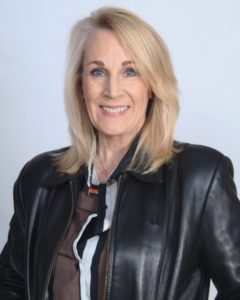
Pilot at Delta Private Jets and former president of the organization Women in Corporate Aviation
How and why did you get into business aviation?
Initially through a discovery flight given as a birthday gift by a family member when I was 13. I thought it was cool, but when they did the same thing at my 17th birthday I was hooked. In the very beginning I didn’t know that I would pursue flying as a career, but over the next few years as I was working on my pilot ratings and certificates, I just wanted to work in the industry in whatever capacity. One of those jobs was at an FBO in Denver. I got up close and personal to business aircraft and I absolutely fell in love with them. I developed a passion and one of my goals was to fly a Learjet.
Do you think the sector is doing enough to encourage women into the sector?
I’ve been in this industry for over 30 years. I took a 10-year break to stay home and be a Mom and when I returned I noticed a huge influx of women, both as pilots and also other roles. I hear more women in air traffic control now than ever before. I think the industry is doing a lot, not only to speak to women, but to encourage young people in general.
But I think more should be done in high schools. I know there are a select few schools that have aviation programs, but they’re few and far between and that’s unfortunate. High school is an opportune time to introduce youth to aviation.
What challenges personally, including sexism, have you ever faced and how did you deal with them?
I don’t recall any discriminating events early on. My flight instructors were always very supportive.
My first challenge was at my first jet job. I was the first female pilot at this company and there was a man who had a bad attitude towards me because his wife didn’t want me there. She didn’t want a female pilot flying with her husband. That transferred to how he treated me. That was an eye opener. I was young, and I had no idea that wives would be a roadblock for me, but it didn’t stop me.
Not long after that I was doing some contract work. There was an opening for a pilot, but the chief pilot said he couldn’t offer me the job because his wife would divorce him. I was stunned but not offended. I’m grateful that he was able to be candid with me.
These issues exist, I just don’t get twisted into knots because of it. We all have our career challenges, but overall my experience has been positive. Over the course of my career more men have helped me to achieve my goals than have ever got in my way.
What advice would you give to women interested in a career in business aviation?
If they have already started flying and they’re working on their ratings but don’t know if they want to go into business aviation or the airlines, I would say, just try business aviation. You’ll have some unique experiences and still have ample time to work for airlines if you want to.
For anyone who hasn’t already begun a career in aviation, but has an interest I might suggest they take a discovery flight, you just might get hooked.
 Catherine Buchannan
Catherine Buchannan
Chief operating officer at charter operator and broker Vertis Aviation
How and why did you get into business aviation?
I was enamored with aircraft from a young age and joined the air cadets at 13. I started flying regularly and my love for aviation was solidified when I worked with a microlight training school called Flylight Airsports as a 15-year-old. I continued on this trajectory with my BSc degree in Aviation Technology and Management at the University of Leeds in the UK, which led to a job at a charter brokerage.
What does Vertis Aviation do to encourage more women to join the company?
Although we are a small business, women sit on our board and there Is a focus on diversity. We are always looking for the good quality candidates first and foremost, regardless of their gender. Half of our team are female. Compared to the industry average, we are at a significantly higher percentage when it comes to gender diversity.
Is aviation encouraging enough women into the sector?
There are more women working in aviation today, especially in positions that were once seen as “jobs for men”. There are women in leading senior positions at the established aviation companies. However, most improvements come from companies that are newer or have more young people involved. They are able to push the boundaries of our industry in many ways, one of which is moving away from a male-dominated culture and being genuinely open to diversity. We have come a long way but there is still a lot of work to be done to achieve gender parity.
How do we encourage more women into business aviation?
It starts at a young age, before girls start thinking about their careers or before their interests have even fully developed. Making Science, technology, engineering, and mathematics as appealing to girls as it is to boys and helping parents to encourage their daughters to view aviation as an option and making a career in aviation the norm for women. These would all go along way in stimulating more women to enter the sector. I even think the goal isn’t necessarily to have more women in aviation, it’s more broadly for women to feel like they can be successful in any field they choose.
What has been the proudest achievement in your career?
Establishing our Dubai office, growing a brand in a completely new region and making it successful enough that we had to hire more team members has been the major achievement of my career. Holding a C-Suite position at a dynamic business aviation company makes me extremely proud.
What advice would you give to women interested in a career in business aviation?
Don’t be afraid to contact women currently working in the industry, we were all on the outside at one point of our careers and would love to introduce business aviation to women just beginning their careers. The opportunity to inspire a new generation of women in aviation is something I want to make a part of my work as I move forward in my career.
Stephanie Chung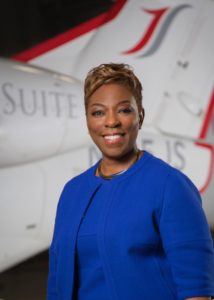
President of charter company JetSuite
Do you think the sector is doing enough to encourage women into the sector?
There’s always more that can be done, but I think we’re definitely making strides as an industry. It all starts with awareness, so at JetSuite, one of the things we do is encourage women by making sure they’re aware of opportunities in the private jet industry. We take pride in supporting associations that will broaden our ability to reach and encourage more women and other marginalized groups.
This year I was able to join the Women in Aviation International conference as a keynote speaker. While there I had the opportunity to meet and inspire some of the incredible women looking to advance their careers or get a start in the industry. We currently have around 31 female crew members working for JetSuite, with approximately eight in management positions.
How can we encourage more women into business aviation?
It partly comes down to awareness. How many people know about business aviation? Most people are familiar with working for airlines, but we, as a sector must do better to make people aware of opportunities in the private jet industry. One way to do that is to market our profession to schools, colleges and career fairs.
Another is to feature more women in advertisements and media relating to the industry. Increasing opportunities to study science, technology, engineering and mathematics as academic subjects can also help. Exposure to these subjects can play a key role in encouraging a greater pool of young girls, who may have a desire to enter our industry, through following interests in areas such as engineering.
Do you think there is equal pay and treatment for women in the sector – what challenges, such as sexism have you ever faced?
I think inequality exists in our industry, just like all others and while it’s not always convenient to do the right thing, it’s time for the industry as a whole to address it. We need to commit to paying women and minorities equally for equal work. A good place to start is looking at the payroll of your people and taking the initiative to make necessary adjustments and ensure that all pay is in alignment.
I’ve experienced sexism myself and handled it by calling people out.
I always did it in a nice way, but I called them out, nevertheless. I’ve found that often times people aren’t aware that they’re even doing it. But, sitting silent while sexism is happening is never an option. If we sit in silence, then nothing changes.
What do you consider your proudest achievement in your career so far?
Making history by being the first African American to run a major private jet company.
What advice would you give to women interested in a career in business aviation?
Jump in. Business aviation is a fun industry. Learn as much as you can, decide which part of the industry appeals to you, study it and be prepared to start at the bottom and work your way up.
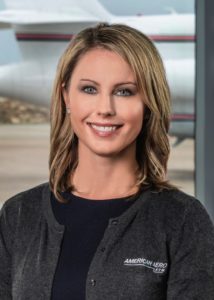 Angela Thurmond
Angela Thurmond
General manager at FBO American Aero FTW
How and why did you get into business aviation?
I happened upon the opportunity by chance when a pilot friend referred me to American Aero. I was initially hired as a member of the customer service team. I didn’t know it would turn into my career and that American Aero team members and customers would feel like family.
I think we all need to understand our why and know what motivates and inspires us to do what we do. My why is the customer base and safety-driven industry, as well as the ability to make people smile and let them feel like the most important person on Earth every time they walk through our doors. As a bonus, I get to work with amazing people and be around some pretty cool airplanes.
Do you think the sector is doing enough to encourage women into the sector?
The industry as a whole is still mostly male-driven. However, over the past few years there have been some pretty incredible women able to forge a path for others. In particular, Mary Miller with BBA Aviation started out in the sector as a customer service representative just like me. She is now the corporate vice president for industry and government affairs at one of the largest aviation / FBO entities in the USA. I’m inspired when I see other women achieve success and earn respect in the industry.
Almost two-thirds of our administrative leadership is comprised of women at American Aero. That is a pretty powerful example to set in this industry, and I think it demonstrates the company’s commitment to rewarding talent, drive and hard work.
How can we encourage more women into business aviation?
I believe that all women want to be compensated based on performance and skill, just like men. The more women assume leadership roles and push through stereotypes that may exist, the more other women will be encouraged to do the same.
What challenges personally, including sexism, have you faced and how did you deal with them?
I have found that being confident in oneself and one’s capabilities is a powerful tool, and respecting others leads to the same fair treatment in return. I am fortunate to have the support of American Aero’s leadership and work in an environment that fosters individual learning and growth. The expectations are high for every member of our team, and we are provided the tools and resources to be successful.
What advice would you give to women interested in a career in business aviation?
I would say go out there, be real and be you. Be confident in yourself and go after the things that mean something to you. Find your why and make it happen.


